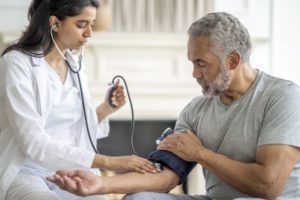How can I help myself with chronic kidney disease?
In this article, we will answer the question ‘how can I help myself with chronic kidney disease?’
So. There are the THREE important things you can do to help yourself
1. Monitor (and write down) the 2-3 numbers written below. The blood and urine tests can be performed and monitored by your GP, but you can do a lot of this yourself; to help GP and nephrologist (hospital kidney specialist) if you have one.
- Creatinine blood test. This is the most reliable measure of kidney function; the higher the number the worse the kidney function. It should be below 120 mcmol/L, and be measured every 3-6 months – more frequently if CKD worsens
- eGFR. The creatinine level determines your eGFR and hence CKD stage – the higher the creatinine, and lower eGFR, the higher (i.e. worse) CKD stage [“yes it is confusing” CKDEx Ed]. eGFR should be above 60 mls/min, ideally above 90 mls/min. It should be also measured every 3-6 months
Note. You can chase your own blood tests using the Patient Knows Best (PKB) website - Protein in the urine. Some patients need urine protein measurements too, this is calculated with a simple urine test. When the kidneys leak protein it is a sign of strain. It is called a ‘uACR’ (urinary albumin-to-creatinine ratio). Again, you should chase the protein level – again via Patient Knows Best.
2. Blood pressure – make this a primary focus. Having normal or low blood pressure is the most useful thing you can do for CKD. So, buy a BP machine from any chemist or large supermarket or Amazon – prices vary, approximately £20-£40. ‘A&D’ is a good make. Take your own BP once a week until stable.

Get your BP checked. Better still buy your own machine and check it yourself.
3. Know your medication. Many people with CKD take alot of medication: to lower blood pressure (especially two types of blood pressure medicine, ACE inhibitors and ARBs); remove fluid (diuretic, i.e. water tablet), control blood glucose, and lower cholesterol.
In more advanced CKD they may take vitamin D, a phosphate binder and erythropoietin (EPO). It is important to understand your medications, and take them as prescribed. Do not run out.
Is there anything more I can do?
Yes.
- Lose weight (if you are overweight). For many patients with CKD, being overweight or obese is a major factor – as it causes diabetes and high BP. So, if requested by a doctor or nurse, please start to lose weight and it will help a lot
- Blood pressure (BP) tablets. Most patients with CKD have high BP. The treatment of high BP is more effective if you follow a low salt diet (see below). Talk to a dietitian or GP about that. Here is more information on how to lower BP
- Angiotensin-converting enzyme inhibitor (‘ACE inhibitor’; e.g. Ramipril) or angiotensin II receptor blocker (‘ARB’, e.g. Losartan). Two types of blood pressure tablets, ACE inhibitors and ARBs, may slow CKD and delay kidney failure, even in people who don’t have high blood pressure. The names of these medicines end in ‘–pril’ or ‘-sartan’. This is because they have a special effect on the kidneys as they reduce protein levels in the urine, which is damaging. Ask your GP to be considered for one, if you are not taking one already
- Sodium-glucose cotransporter 2 (SGLT2) inhibitor (e.g. Dapagliflozin) – are a newish class of diabetic tablets that reduce blood glucose levels by increasing urinary glucose excretion. They also may slow CKD and delay kidney failure. And they have also been shown to be useful for many patients with diabetes (especially DM2) and heart failure (CHF) – especially if there is a lot of protein in your urine (with or without diabetes). Again, ask your GP if you are not on one.
“Kidney doctors now recommend ‘3 actions in 3 months’ = maximise dose of ACE/ARB, add SGLT2i, then get the BP under 130/80, when CKD is diagnosed for most patients. Ask your GP if you can have that approach”.
- Specific treatments – for different diseases exist. Make sure those specific treatments have been considered, and started if appropriate
- Diet. There is no such thing as a ‘CKD diet’. In the earlier stages it is OK to eat normally. Later on dietary restrictions or encouragements may be advised. A low salt and protein diet may help to control CKD symptoms. You can request to be referred to a dietitian
- Support network. It is important to build up a support network of friends, family members, healthcare professionals, organisations, charities and patient groups that you can go to for help, advice and information – if you need it.
Note. The Kidney Care UK charity is an important one. They can give you advice, especially on financial and employment issues, and give you grants – say for helping with the cost of dialysis (e.g. travelling) and heating bills. They have useful info like this on their website. There may be a local kidney charity called a Kidney Patient Association (KPA). See if you can find your nearest one.
Summary
We have described how can I help myself with chronic kidney disease. We hope it has been helpful.
Last Reviewed on 6 June 2024
